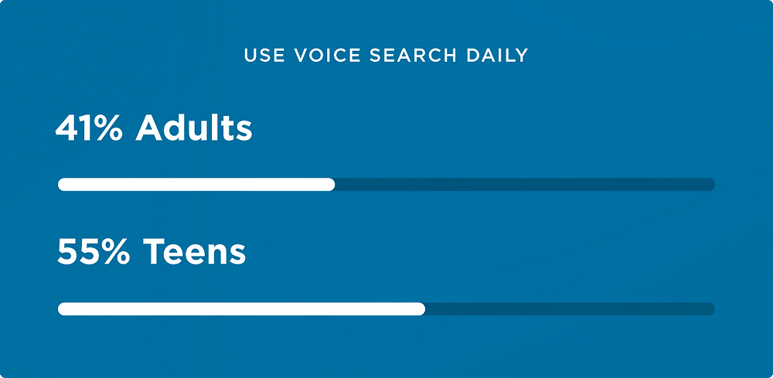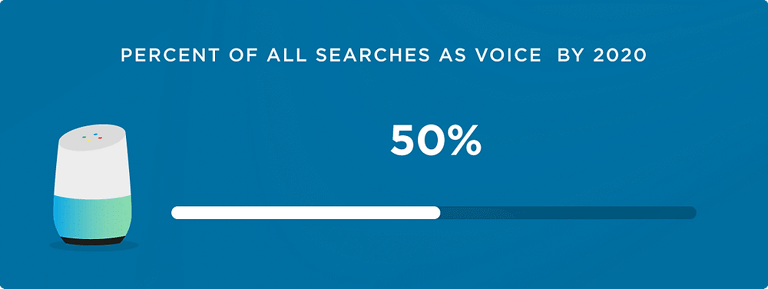
For SEO lovers like ourselves, there’s nothing juicier than a perfectly optimized piece of content.
SEO, or search engine optimization, refers to the practice of making websites more attractive to search engines. It rocks, and we talked about its value back in 2016.
We covered the basics of SEO in that article. In this one, we’ll spotlight important SEO trends that every marketer should watch out for in 2020. Let’s get started.
Trend 1: The Rise of Voice Search
Voice assistants are everywhere. It’s estimated that 111.8 million people in the U.S. use them monthly. Just ask one anything and you’ll receive an answer instantly. That’s power, and it’s a big reason why voice search has exploded in the past 5 years alone. Look for new restaurants, turn the lights on, play music, or prove your friends wrong whenever you want to. Voice search has changed the way we access and control information.
It’s really, really fast too. You’ll find what you’re looking for in seconds. That’s a godsend because no one likes waiting. Voice recognition is far from perfect, but it’s inching closer to it every year. More and more consumers are relying on their voices instead of their keyboards to browse the Internet.
Voice vs text. The stats (via Urban Analog):
-
For use when multitasking - when hands/vision are occupied (ex: driving) - 61%
-
Speed of search results versus typing in query - 30%
-
Ease of use vs typing - 24%
-
The fun or cool factor - 22%
-
Avoid menu confusion or searching for UI - 12%
-
Other - 1%
More stats:
-
41% of adults and 55% of teens use voice search everyday (Google)

-
20% of all Google mobile queries are voice searches (source).
-
Voice search queries in 2016 grew 35x since 2008 (Search Engine Watch).
-
By 2020, experts believe that 50% of all searches will be voice searches (source).

Quick tips to optimize your content for voice search
-
The most successful voice search queries contain 3 words. Long-tail keywords can work to your advantage.
-
Include questions and colloquial phrases in your content, since both tend to occur more frequently in speech.
-
Know your audience. Consider its language style and come up with matching voice search queries.
Trend 2: Mobile-First Indexing
Mobile-first indexing is Google’s initiative to prioritize mobile versions of content for indexing and ranking. We talked about it in one of our previous articles here.
As of July 1, 2019, all new websites are indexed using mobile-first indexing. In its official statement, Google wrote, “we're happy to announce that mobile-first indexing will be enabled by default for all new (and previously unknown to Google Search) websites starting July 1, 2019. It's fantastic to see that new websites are now generally showing users - and search engines - the same content on both mobile and desktop devices! For older websites, we’ll continue monitoring and evaluating pages for their readiness for mobile-first indexing.”
Did you know? Publications created with Joomag are optimized for all devices and platforms.
Trend 3: Importance of Mobile Page Loading Speeds
For a while now, desktop page load times have been a ranking factor for Google’s search algorithm. In July 2019, page speed became a ranking factor for mobile searches, too.
Google recommends its updated PageSpeed Insights tool to measure website page speeds. Click here for more information on the company’s aptly named Speed Update.
Create head-turning publications that look great on any device.
Examples of SEO-optimized digital publications
Norwex Catalog
Dixon Ticonderoga Catalog
My French Country Home Magazine
FAQ
1. Why has voice search become a significant SEO trend?
Answer: Voice search's popularity is surging, with 111.8 million people in the U.S. using voice assistants monthly. Its convenience for multitasking and faster search results have transformed how we access information, making it crucial for SEO strategies to adapt by focusing on natural language and question-based queries.
2. What is mobile-first indexing, and why does it matter?
Answer: Mobile-first indexing means Google predominantly uses the mobile version of a website for indexing and ranking. Since July 1, 2019, all new websites are subject to this, reflecting the shift towards mobile browsing. This trend underscores the importance of optimizing websites for mobile devices to improve visibility and ranking.
3. How important is mobile page loading speed for SEO?
Answer: Incredibly important. As of July 2019, Google considers page loading speed a ranking factor for mobile searches, in addition to desktop searches. Faster mobile page speeds not only enhance user experience but also contribute to better search rankings, making it essential for websites to optimize their loading times.





